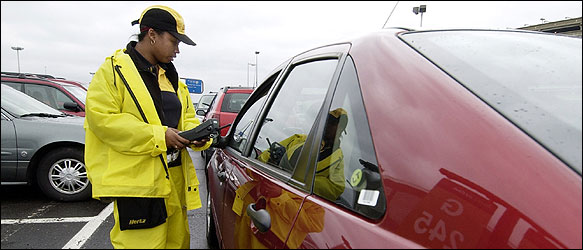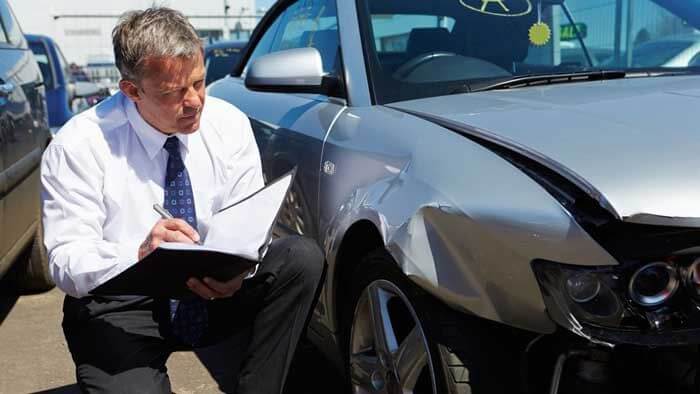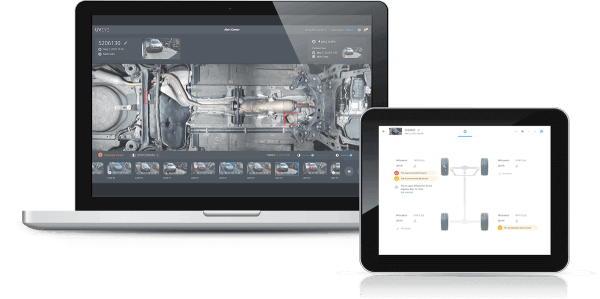This is How Car Rental Agencies Can Maintain Accountability
After a long flight, the last thing that any of us want to do is deal with hassles in picking up our rental car.
In the best case scenario, your reservation is in order and the rep will have you out the door in a matter of minutes with the keys in hand, ready to hit the road. However, no matter how much the process of payment and reservations has been moved into the 21st century, we are still stuck with the friction of inspecting the vehicle for damages before driving off the lot.
Everyone knows this dance...
The agency’s inspector moves around the vehicle, marking down issues that they see on a piece of paper or with their phone. The renter, if they are well-traveled enough and have the patience, takes pictures on their phone in an attempt to collect evidence in case a dispute arises upon the vehicle’s return.
This process is adversarial, takes up valuable time, and is hardly conducive to the long term customer relationship that rental companies are seeking to build.
The Friction — Common Challenges for Inspecting Rental Vehicles
Depending on how rushed they are, the angles that the pictures are taken, and maybe even the quality of their cameras, this haphazard effort at documentation is subjective at best.
Lacking consistency from inspection to inspection, it is an insufficient method of tracking damages not only for a specific rental period but over the lifetime of the vehicle as well. Every time that a vehicle goes out, neither party really knows which issues are really from that customer or a previous renter.
Without a consistent record that takes into account all damages over time, the customer can feel that there is a lack of transparency and have a nagging feeling that they may end up getting charged for damages that they are not responsible for. There is always the chance of an issue that the inspector missed before the car went out that another inspector with a keener eye may find upon return and charge the customer for, leading to a dispute.
For their part, the rental agency is in the unenviable position of seeking to assign responsibility for damages to their vehicles while at the same time leaving the customer feeling that they were treated fairly. One of the problems is that their inspectors lack a consistent standard for knowing when a new issue has appeared, and whether or not to charge the customer for the damage. Manual inspections carried out by inspectors making $11 an hour are far from the comprehensive solution that they need.
Given the fact that the average airport sees between 500 to 1000 vehicles go through their lots a day, they need to find an inspection and documentation solution that is far more scalable and objective if they are going to succeed.

Turning to Artificial Intelligence for Greater Scale and Coverage
Machine learning technology offers rental agencies a viable alternative to manual methods, helping them to achieve both faster service and more comprehensive inspections.
Utilizing machine learning’s ability to track issues over time, rental agencies can easily scan, track, and compare images of their vehicles from rental to rental. The way this works is the system creates a baseline picture of the vehicle with scanning devices that capture high-quality images of the vehicle as they drive past, taking thousands of pictures that are quickly assembled into a clear image. The system then tracks changes as they occur between scans to find new issues.
Having been trained on thousands of scans, these machine learning algorithms are able to detect anomalies and can help the inspectors by automatically identifying them on the image. This helps to take the guesswork out of determining whether there is an issue with the vehicle that might be missed by the human eye, and significantly speeds up the inspection process.
These systems can inspect everything from the vehicle’s exterior, undercarriage, and even tires to detect damages, wear and tear, or other issues that can put the passengers and driver at risk.
Moreover, it makes an otherwise subjective process an objective one, maintaining the same standard of inspection throughout the company. So it doesn’t matter if a customer picks up their car in Austin and returns it in San Jose, they can expect consistency from branch to branch.
For the company, constant tracking has the added benefit of allowing them to carry out smarter predictive maintenance and avoid unplanned downtime. The system helps them to identify issues like broken parts, the start of an oil leak, worn down tires, and other problems that can be far easier to fix at an earlier stage before they become more expensive and expansive down the line.
Watch how UVeye identifies issues throughout the complete automotive lifecycle in the car rental sector
Renewing a Sense of Fairness for the Customer
Implementing automated vehicle inspections can serve as a force multiplier for rental company employees, empowering them to focus on the aspects of their job that require that ever-important human touch.
With the whole process of scanning, detecting, and even alerting on issues taking a matter of seconds for most types of inspections, the customer can simply drive back onto the lot having passed through the scanner and leave without the need for a time consuming check upon return.
If an issue does come up from the renter’s use of the vehicle, then there is clear documentation that can be the basis for claims, mitigating the circumstances for additional conflict with a customer. At the end of the day, most customers will take responsibility for the damages that they cause. They just want to feel like they have been treated fairly.
By creating a clear record of the status of the vehicle from rental to rental, agencies can avoid eating the cost of undesignated damages, reduce the overall stress of renting a car for the customer, and hopefully keep them coming back for years to come.
Learn more about how UVeye gives rental agencies the tools they need to scan, detect, and track issues with their vehicles




